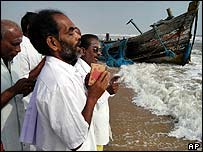3rd Year Week 1 HT05
Topic: Tsunami
|
Translate the following first nine paragraphs into Chinese. Tsunami early warning 'next year'
A tsunami early warning system for the Indian Ocean could be up and running by the middle of next year, Unesco head Koichiro Matsuura has said. The head of the UN's cultural and scientific agency said a $30m system could be in place by June 2006, with a global one to follow a year later. A warning system might have prevented many thousands of deaths in India and Sri Lanka in the 26 December tsunami. Such a system already exists for the Pacific Ocean region. Seismologists knew almost immediately about the earthquake off Indonesia which triggered the tsunami, but there was no way of relaying that information to people in the region. Mr Matsuura was speaking in Mauritius at a conference on challenges facing small island states. The conference opened on Monday with calls to set up a system to help the world's most vulnerable low-lying states cope with natural disasters. The calls came as the Indian-administered Andaman Islands, which were hit by the tsunami, continued to be hit by high tides, forcing inhabitants to stay on higher ground. Officials say the 9.0 magnitude earthquake which caused last month's massive wave surges may have changed the islands' geography, making some areas more vulnerable to flooding. Need for education The BBC's Elizabeth Blunt in Mauritius says it will be possible to put a system into operation by next year because warnings can be disseminated by an already-existing meteorological network, which sends out cyclone and other severe weather warnings. The main expense would be the cost of a number of deep water measuring devices on the ocean floor, which would relay wave movements to surface buoys and then to a satellite. That information, and data from an extended network of tide gauges, would be collated at a new Indian Ocean tsunami centre. When they get the warnings it will then be up to each individual country to take appropriate action. People also have to be educated on how to respond to warnings, a process which Mr Matsuura said would take much longer to implement than the technology. But he said $30m was a small price to pay. "It's peanuts compared to what happened," he said. "We learned this in a very costly way." Unesco is expected to give the new system the go-ahead in June this year. Our correspondent says the final phase of the conference will include a discussion of world trade agreements, which are threatening the special treatment that small island nations used to count on for their agricultural exports. There is also likely to be trouble over the perpetually difficult question of climate change, she says.
BBC News Last
Updated:
Wednesday, 12
January, 2005,
20:44 GMT
|
